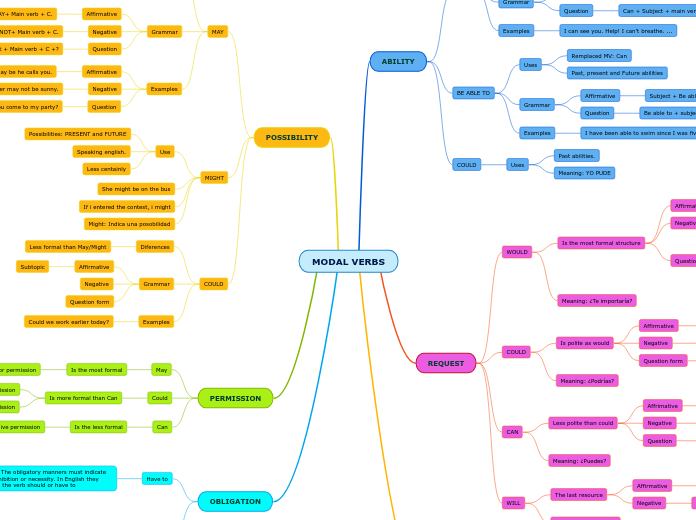
CAN
Uses
Present ability
Meaning is: YO PUEDO
Grammar
Affirmative
Subject + Can + Simple verbs + ...
Question
Can + Subject + main verb + ...?
Examples
I can see you. Help! I can't breathe. ...
BE ABLE TO
Uses
Remplaced MV: Can
Past, present and Future abilities
Grammar
Affirmative
Subject + Be able to + simple verb + ...
Question
Be able to + subject + main verb + ...?
Examples
I have been able to swim since I was five.
COULD
Uses
Past abilities.
Meaning: YO PUDE
WOULD
Is the most formal structure
Affirmative
Subject + WOULD + Verb + C
Negative
Subject + WOULD + not +Verb + C
Question form
WOULD + You + verb + C ?
Subtopic
Subtopic
Meaning: ¿Te importaría?
COULD
Is polite as would
Affirmative
Could + Subject + verb
Negative
Couldn't + Subject +
Question form
Could + You/I + verb + C ?
Could you help me for a minute, please?
Meaning: ¿Podrías?
CAN
Less polite than could
Affrimative
Can + Subject + the verb
Negative
Can't + Subject + the verb
Question
CAN+ You/I + verb + C ?
Can you pass the salt please?
Meaning: ¿Puedes?
WILL
The last resource
Affirmative
Subject + Will + the verb
I am doing my Homework.
Negative
Subject + Will not + the verb
He will not buy some books next week.
Meaning: ¿Harías ....?
SHOULD
Positive advices
Subject + should + basic verb
SHOULD NOT
Negative advices
Subject + shouldn't + basic verb
WOULD
Take the place the speaker
If I were you, I WOULD + verb + C
I WOULD + verb + C, If I were you.
OUGHT TO
These modal verbs are should, ought to, and had better. In Spanish they would be equivalent to should, you should.
Subject + Ought + basic verb + ...
MAY
Use
Possibilities: PRESENT or FUTURE
Writing English
More certainly
Grammar
Affirmative
Subject + MAY+ Main verb + C.
Negative
Subject + MAY NOT+ Main verb + C.
Question
MAY+Subject + Main verb + C +?
Examples
Affirmative
Today may be he calls you.
Negative
Tomorrow the weather may not be sunny.
Question
May you come to my party?
MIGHT
Use
Possibilities: PRESENT and FUTURE
Speaking english.
Less centainly
She might be on the bus
If i entered the contest, i might
Might: Indica una posobilidad
COULD
Diferences
Less formal than May/Might
Grammar
Affirmative
Subtopic
Negative
Question form
Examples
Could we work earlier today?
May
Is the most formal
Give and Ask for permission
May + subject + the verb
Could
Is more formal than Can
Ask for permission
NOT for give permission
Could + Subject + the verb
Can
Is the less formal
Ask and give permission
Can + Subject + the verb
Have to
Manners of obligation. The obligatory manners must indicate obligatory nature, prohibition or necessity. In English they would be equivalent to the verb should or have to
Negative
no obligation in the past We didn't have to go to school on Saturdays.
Subject + must not / musn't + infinitive
Affirmative
obligation in the past I had to wear a school uniform when I was a child.
Subject + must + infinitive
Question Form
Must + Subject + infinitive ...?
Must to
We use have to / must / should + infinitive to talk about obligation, things that are necessary to do, or to give advice about things that are a good idea to do.
Negative
Sujeto + auxiliar negativo (tiempo corresp.) + have to
+ infinitivo
Affirmative
Sujeto + have to (tiempo corresp.) + infinitivo